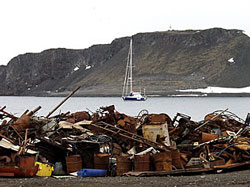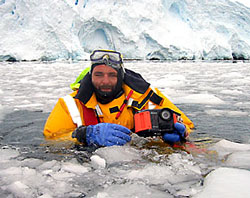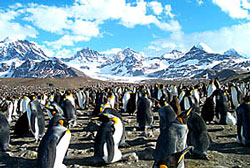Mission Antarctica set up by Robert Swan after walking
to both South & North Pole. Antarctica is a truly
unique place, but not as white and pristine as you would
first imagine, and Robert was amazed at the rubbish
problem.
Antarctica is not owned by anyone, however 44 signatory
countries administer the continent. The treaty was set up
so that it could be looked after for the future and states
that everything brought in to the continent must be taken
out, but obviously this was not happening.
 In 1992 Robert was the keynote speaker at the
first Earth Summit in Rio and spoke about the rubbish
problem in Antarctica. With their approval he then set up a
project to do something about it, choosing the Russian Base
of Bellingshausen, as it was one of the worse areas. Also,
it was accessible to visiting ships and had a runway
nearby, allowing both easy access for research into the
removal and aiding the difficult logistics.
In 1992 Robert was the keynote speaker at the
first Earth Summit in Rio and spoke about the rubbish
problem in Antarctica. With their approval he then set up a
project to do something about it, choosing the Russian Base
of Bellingshausen, as it was one of the worse areas. Also,
it was accessible to visiting ships and had a runway
nearby, allowing both easy access for research into the
removal and aiding the difficult logistics.
For a number of years a team of Russian volunteers cut,
compacted and moved the scrap onto the beach, stockpiling
it to ease the removal later.
During December & January 2001/2002 the Ship “Anne
Boye” was chartered and sailed to King George island to
remove the scrap. A small team of 5 from the UK, together
with the Russian volunteers then managed to move 1,000 tons
of scrap from the beach onto the ship, all within 3
weeks.
The site was then levelled by JCB and within that week,
the penguins and seals were back on the beach, oblivious to
its former history. The waste was then taken to Uruguay for
recycling, with the Dangerous waste like Asbestos, fuels
and oils, taken to the UK for specialist disposal.
The Yacht “2041” (so named as this is the renewal date
of the Antarctic Treaty) played an important role in the
operation, as the main aim of the project was worldwide
education.
For the first time ever, crew would be flown into the
Antarctic to join the yacht for 8-10 day voyages,
experiencing firsthand the cleanup, together with the
awesome beauty in areas, as yet, untouched or visited by
man.
Young people and teachers from 19 different countries
sailed onboard Voyages 1 and 2. The aim was to get young
people interested now, in preserving Antarctica, which
would mean that in their later years when they were working
and in possible leadership roles, they would remember this
and take positive action to look after the Continent.
Voyage 3 allowed Robert, together with the sponsors, to
observe firsthand the cleanup in operation. Voyage 4 was
especially for young underprivileged South Africans. They
had never even seen the sea before, let alone ice, when
they visited the Continent. The final voyage sailed much
deeper into the southern peninsular regions, observing how
other bases are dealing with their waste. New territories
were explored, before returning to S. America ahead of the
winter, now closing in. The yacht had now sailed over
4,000M during our 3-Month Antarctic Expedition.
After resupplying in Argentina, the yacht sailed 1,400M
to South Georgia, for a two week Expedition to see how the
wildlife was coping with the waste left in the numerous
abandoned Whaling Stations.
From the near extinction of the seals during the whaling
era, they have made a spectacular recovery, and now they
rule the very stations that nearly pushed them to the brink
of extinction on South Georgia. There are now estimated to
be over 1.5 million Fur seals resident on the Island, as
well as thousands of Elephant Seals.
 South Georgia is truly one of the world’s
most spectacular wildlife habitats. This is mostly due to
its desolation and the fact that man finds it so very hard
to reach it – even in this day and age.
South Georgia is truly one of the world’s
most spectacular wildlife habitats. This is mostly due to
its desolation and the fact that man finds it so very hard
to reach it – even in this day and age.
King penguins gather to breed in massive numbers, due to
its year round access to the sea. On this beach alone there
were estimated to be over Half a Million penguins!
On arrival in Cape Town, after a round trip of over
12,000M, the yacht was lifted out the water to be
transported overland to Johannesburg, for The World Summit
on Sustainable Development, where Robert addressed the
United Nations on the success of the project in Antarctica.
The yacht become a “floating petition” containing the names
of thousands of young people who have pledged their support
to the project on preserving & managing Antarctica
During all the Expeditions the crew filmed 25 hours of
DV footage, using high quality digital video, together with
over 5,000 digital images and 5,000 film images on
Transparency. The images were complied, using the onboard
video edit suite, onto CD’s for the Participants, to take
back to their respective countries to show how the project
had succeeded in the waste removal.
Andrew Dare is now conducting multimedia presentations,
which explains the whole project from it start in Africa,
the cleanup in Antarctica & the return to Africa, via
South Georgia.
If you would like further details of this amazing
expedition and project or to obtain images, please contact
the Yacht Captain, Andrew Dare, e-mail: andydare@bigfoot.com

 Two areas demand to be visited. These are the old
part of the city at Ortygia, where the bus terminus was,
and the Parco Archeológico. I went down to Ortygia that
same evening, just too late for the tourist office opening
times, and enjoyed a brief stroll round and a good pizza.
It was quite good enough to call me back the next morning
but, other than getting the map and literature I wanted
from the tourist office, I was just a shade disappointed.
Ortygia is near enough an island and not a very big one; I
had not realised that the point, which should have given a
good sea view, was out of bounds to visitors because of the
requirements of the army. In general the area should
probably be regarded as a must see by anyone who has not
been to any of the beautiful old towns on the Italian
mainland but, unusually, I was as much struck by the
displayed poverty of some areas as anything. The cathedral
is very interesting, though scarcely beautiful, from the
outside with bits being part of an earlier Greek temple.
However, contrary to my usual view in southern Europe, the
interior, which contains some strikingly beautiful columns,
provides a better spectacle. Taken as a whole I preferred
Ortygia at night and the jury was still out on Siracusa as
I took a bus and then a walk to the entrance to the Parco
Archeológico.
Two areas demand to be visited. These are the old
part of the city at Ortygia, where the bus terminus was,
and the Parco Archeológico. I went down to Ortygia that
same evening, just too late for the tourist office opening
times, and enjoyed a brief stroll round and a good pizza.
It was quite good enough to call me back the next morning
but, other than getting the map and literature I wanted
from the tourist office, I was just a shade disappointed.
Ortygia is near enough an island and not a very big one; I
had not realised that the point, which should have given a
good sea view, was out of bounds to visitors because of the
requirements of the army. In general the area should
probably be regarded as a must see by anyone who has not
been to any of the beautiful old towns on the Italian
mainland but, unusually, I was as much struck by the
displayed poverty of some areas as anything. The cathedral
is very interesting, though scarcely beautiful, from the
outside with bits being part of an earlier Greek temple.
However, contrary to my usual view in southern Europe, the
interior, which contains some strikingly beautiful columns,
provides a better spectacle. Taken as a whole I preferred
Ortygia at night and the jury was still out on Siracusa as
I took a bus and then a walk to the entrance to the Parco
Archeológico. In 1992 Robert was the keynote speaker at the
first Earth Summit in Rio and spoke about the rubbish
problem in Antarctica. With their approval he then set up a
project to do something about it, choosing the Russian Base
of Bellingshausen, as it was one of the worse areas. Also,
it was accessible to visiting ships and had a runway
nearby, allowing both easy access for research into the
removal and aiding the difficult logistics.
In 1992 Robert was the keynote speaker at the
first Earth Summit in Rio and spoke about the rubbish
problem in Antarctica. With their approval he then set up a
project to do something about it, choosing the Russian Base
of Bellingshausen, as it was one of the worse areas. Also,
it was accessible to visiting ships and had a runway
nearby, allowing both easy access for research into the
removal and aiding the difficult logistics.
 South Georgia is truly one of the world’s
most spectacular wildlife habitats. This is mostly due to
its desolation and the fact that man finds it so very hard
to reach it – even in this day and age.
South Georgia is truly one of the world’s
most spectacular wildlife habitats. This is mostly due to
its desolation and the fact that man finds it so very hard
to reach it – even in this day and age.